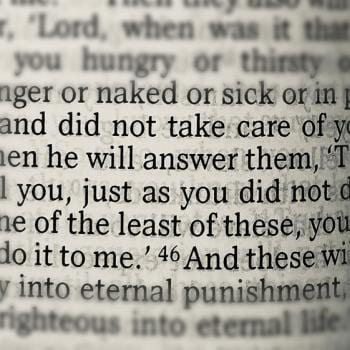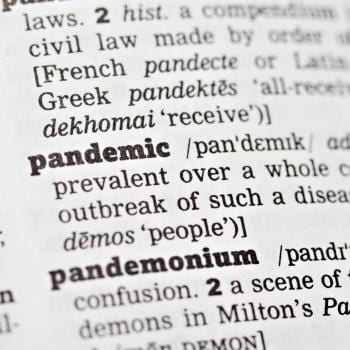Jeffrey Weiss, a reporter with the Dallas Morning News, has asked these questions concerning the episcopal situation facing the North Texas Conference: “Why does this matter? And to who? Clearly, it’s a big deal to North Texas Methodist clergy. But who else should be paying attention? And why?”
Here is my response:
Does this Episcopal situation matter to anyone besides the United Methodist clergy?
Three Levels
On one level, and speaking on a short term time frame, no, not really. We clergy and the members of the churches we serve are the only ones who experience anything directly. Even then, it will mostly just be clergy. And among the clergy, only a few will see much immediate fallout. Most everyone else will go on doing what we’ve always been doing, and trying to ignore what may be a fatal blow to our connection as the slow internal hemorrhage of pain, mistrust and discouragement takes its toll.
One a second level, and on a longer-term time frame, it matters because while we United Methodists may not be huge in number, we do have a large impact in the quiet and generally unnoticed work of patching broken lives back together again. Because of our strong social conscience, Methodists from the beginning of this movement in 17th England have been on the forefront of living out our faith by feeding the hungry, clothing the naked, visiting the prisoners, caring for the outcasts, rescuing the children, and bringing health to the ill, both of body and mind. This hidden work is part of the glue that holds both the Metroplex and the larger civilized world together and offers the sweet aroma of goodness and grace to a world sorely lacking in both.
Religious people, particularly Christians, are often mocked in the press because of our proclivity for silly arguments over the minutest details of doctrine, stupid social positions, disgustingly hateful pronouncements about racial, gender and sexual issues, and moral scandals among clergy. Those things make good reads and are used as fodder to say, “See, they really are a bunch of hypocrites.” What rarely sees wide publicity is the immensely transformational nature of much of our quiet work. Let the United Methodist church come apart by this apparently unimportant disagreement, and the power and goodness that comes from that quiet work may easily dissipate. We will all feel the loss of these sweet services of grace, even those with no direct involvement with United Methodists, but most won’t know the root cause of the loss.
One a third, and most important level, what we as small group of clergy and churches are experiencing is the universal human story. This is the story of trust, betrayal, its aftermath and the long and complicated path to forgiveness and finding trust again. And this is why the story needs to be told.
The Covenant Connection
United Methodist clergy, all of whom in some way or another have devoted our lives to living out the call to serve God and the community, are held together by a covenant. A covenant is much more than a contract. It is, like the marriage covenant, a binding of souls together for better or for worse.
I often tell the members of my congregation that the people who are most likely to hurt them painfully are the ones to whom they have made themselves most vulnerable, most “woundable” so to speak. Who are they? Spouses, parents, children, extended family, long-time friends, confidants, employers.
They are the ones with whom we explore the basic question that haunts everyone: can we both be fully known AND fully loved?
They are the one who can and do find our most tender places and dig the knives of betrayal in deep.
They are the ones we consistently have to learn to forgive and to re-engage in covenant life.
United Methodist Clergy have that kind of covenant with our Bishop. It is the Bishop who decides which clergy person will serve where and for how long. We have all taken a vow of itinerancy–this is part of our heritage from John Wesley, the founder of the Methodist movement. We will go where we are told, and do so trusting that our Bishop makes those decisions with wisdom, grace, genuine love for us as brother and sister clergy people, and with adequate knowledge of both congregation and clergy in order to put the right person in the right place.
Some clergy move frequently. Some stay in one place for 20, 30 even 40 years. But all technically are subject to the decisions of the Bishop about placement. Any one at any time may receive a call and hear, “The Bishop has appointed you to . . . ” Our entire lives, the lives of our spouses and children, and the lives of our congregations can be radically turned upside down.
It takes a lot of trust to live and work in a situation like this.
Broken Trust
The trust that held that fragile covenant (and all covenants made by humans are fragile by nature) has been broken. On all sides of this situation, there are people who feel utterly betrayed, stabbed in the back, and sucker-punched. The breath has gone out of us–but as it comes back in, anger tends to accompany it.
Anger in and of itself is not necessarily bad. It can energize us to fight with passion the most evil of oppressions. Or it can turn into an evil oppressor itself.
Again, this is the human experience. What we live through on the micro level of Bishop/Clergy/Laity of the North Texas Conference of The United Methodist Church is also lived through on the macro level of all human experience. What we bring to its resolution is a faith centered on Jesus who says, at the moment of total betrayal, “Father, forgive them for they know not what they do.”
The Universal Questions
We are, I suspect, going to be asking the same questions that every other single person who has been betrayed asks. Those questions are:
- “What does forgiveness look like?”
- “Does the work of forgiveness mean that I must stay in intimate relationship with the those who appear to have betrayed me?”
- “How can I learn to trust again?”
We’re going to have to ask those questions on a deeply personal level and on a larger, connectional level. As we ask them, we will decide once more if the Gospel is true.
If we cannot get through this without destroying one another, then the larger world is right to ridicule us a deceived people who have bought into a lie.
If it is true that God’s love for us is so powerful that God will go to all lengths to bring us back into reconciled intimacy with God, then it is time to live it out.
We must discern what is expected of us and of God in that journey toward healing, forgiveness, regained trust and reconciliation.
My Own Story
I speak very personally here for a moment. A number of years ago, I chose to end my first marriage. My husband at that time was/is not a bad or evil person. I was/am not a bad or evil person. But the relationship itself had become a place of death–I could not stay alive as an individual and stay in the marriage. After several years of serious contemplation of and hope for my own death, I chose life and also chose to offer forgiveness but without the kind of reconciliation that would continue to leave me vulnerable to the damaging dynamic of the relationship.
Was it an ideal solution? Hardly. The repercussions will go on for generations and it took me years to come to deep peace with it and to hope and pray nothing but goodness for the man who is the father to my children. But even with those hopes and prayers, I would not be married to him again.
The choice to trust again after such an experience was complicated and fraught with fear for me. But I knew that by living in suspicion of others, I would deny myself the joy of intimacy forever.
A little while ago, I went to take a walk. As I am writing this, I am staying alone at my oldest son’s house, in a suburb south of London, England. Near his house are several heavily forested areas with multiple walking and bridle paths. There is no map of the paths, and I often wonder if I might get lost in my perambulations.
As I went to take this walk, I walked alone in a part of the forest I had not explored before. The skies were darkening with oncoming rain. Although prepared for the rain, I wondered, “Can I trust that everyone I might encounter on these lonely and gloomy paths will be adequately civilized so I may get home safely?”
I became suddenly aware that no one knew where I was or would even know that I had not returned safely for at least 24 hours when I was scheduled to pick up the grandchildren from school.
With each turning of the path, I had a choice: stick with the route I knew, have a decent walk, get home and lock the door against other possibilities, OR, try a different route, risk getting lost and possibly hurt, and see what I can discover about myself and God.
Several times, I chose the unknown route, knowing that if I faced my demons and looked them straight in the eye, I had a chance of loving them into submission. But if I let them win, they are my masters. Demons make poor masters but great jailers.
Facing Our Demons
That’s why this this episcopal mess is important to many more than just a small group of beleaguered, tired and often discouraged clergy people. What we do in response will, in its own way, change the world. We’ll either face our demons and love them into transformation or we will let them win and shut ourselves away. There is no such thing as a neutral act, and no such thing as an act that does not affect in some way everything it touches. And we United Methodists touch a massive number of things in this area, in the US, and in the world.
We will either learn to trust again and become more able to speak our truth in love, or we’ll stuff our truths away and build the fortifications around our souls so we won’t be hurt again–and we will lose our hope of redemption.
There is nothing easy about what is before us. That, also, is the universal human condition. Certainly, some life choices glow clearly, with the righteous and holy path fully illuminated. Most do not–most choices flicker with multiple shades of grey dancing in the shadows of our minds and hearts. We wander now into those shadowy and gloomy gray areas littered with hidden and yet to be explored paths. It will take much wisdom, humility, prayer, courage and forgiveness to find our way out. Again, this is the universal human experience.
That’s why this is important. The painful, slow process of resolution will not gain national press. But it will have a long term effect on our faith and society, and we are foolish to believe otherwise.












